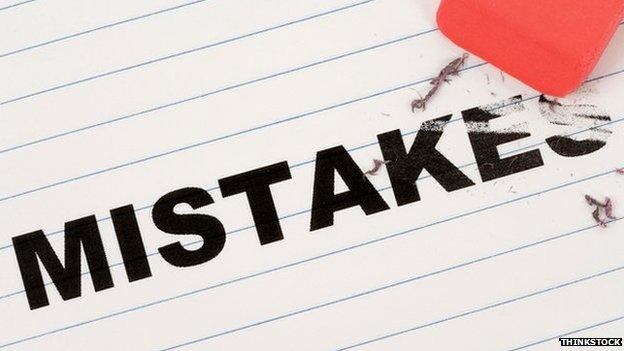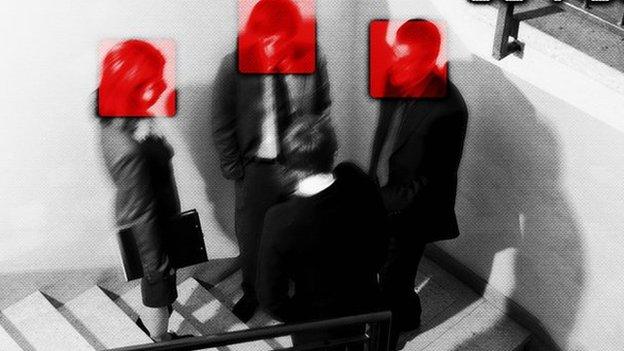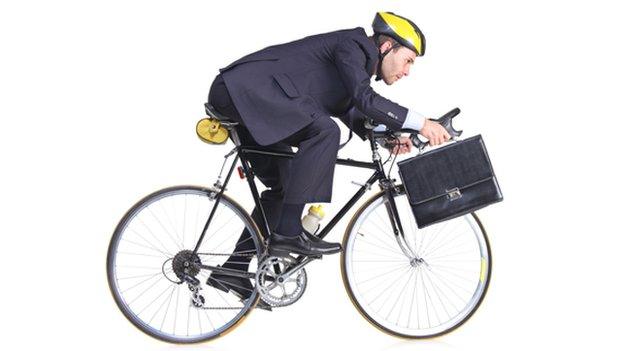Why typos and spelling mistakes don't really matter
- Published
- comments

We should not get overly obsessed with making spelling mistakes or typos, because they are not what makes our writing good or bad, says author and Financial Times columnist Lucy Kellaway.
In a recent column about Sheryl Sandberg, I spelt her first name with a C. I read the piece over a few times before submitting, as I always do, saw nothing amiss, and pressed "send".
I have spent 30 years in journalism, and there I was misspelling a name I had spelt correctly dozens of times before.
Had the mistake not been spotted, the newspaper would have looked ridiculous and I would have seemed sloppy, dim and outrageously unprofessional.
The truth is, I've always had a flair for typos. It is not getting better with experience - nor with spellcheck. My ability to introduce mistakes has kept well ahead of the efforts of Microsoft and Apple to eliminate them.
Because I know I have a problem, I try to help myself. I print my articles out and read them on paper.
I change the font for the final read-through to the hideous Comic Sans as the gawky shape of the letters sometimes exposes a mistake that had been hiding. But even then, lots get through.
Checking on autopilot
Given my poor record, I was cheered to read an article in Wired, external saying we make typos not because we are dim, but because we are clever.
Writing is a sophisticated job and our brains focus on the structure, the sentences and the phrases, leaving the close-up work to be done on autopilot.
Afterwards we are programmed to read only what we think we have written, not what we actually have. If that is the case, it is odd that we make such a phenomenal fuss about them.
Earlier this summer the New York Times carried a front page story about a speech Barack Obama had given on US foreign policy with a headline referring to his "Cautious Reponse to World Crisis".
The story was much followed up, not because people were worried Obama was soft on terror, but because of the missing S from "response". "New York Times prints glaring typo on front page," crowed the Huffington Post, external.
Biblical errors
Not only are there typos in the NYT, there are even some in the Bible.
A Christian blogger in Canada last year unearthed a missing apostrophe in her edition - "If we are crazy, it's for God sake", 2 Corinthians 5:13 - and was so shocked she wrote an entire post about it, external.
My sense of God is that He'd take this in His stride and would only get steamed up if a typo changed the meaning of His word by, say, omitting a "not" from "thou shalt not commit adultery". Otherwise, surely, He'd just shrug.
Although the indignation of mortals on typos is overdone, it is usually harmless enough. It gives us a jolt of outrage tinged with superiority every time we spot one, and feeling superior does the morale a power of good.
Provoking a response
Yet sometimes it leads to bad decisions. On LinkedIn a recent blog entry, external from one of its "Influencers" lists the five sorts of people you should never hire. Number two is "The One with the Typo".
I would also disqualify a CV with a typo in it - but only if I were trying to hire a proof reader. If human beings have any remaining competitive advantage over the machines, it is not our skill at crossing i's and dotting t's.
It is our ability to write something that provokes a response - and not just because it contains a howler or a spelling mistake.
Lucy Kellaway is an author and Financial Times columnist. Listen to her on Business Daily and World Business Report on BBC World Service every Monday.
- Published20 October 2014

- Published4 August 2014

- Published16 June 2014

- Published13 January 2014

- Published16 December 2013
